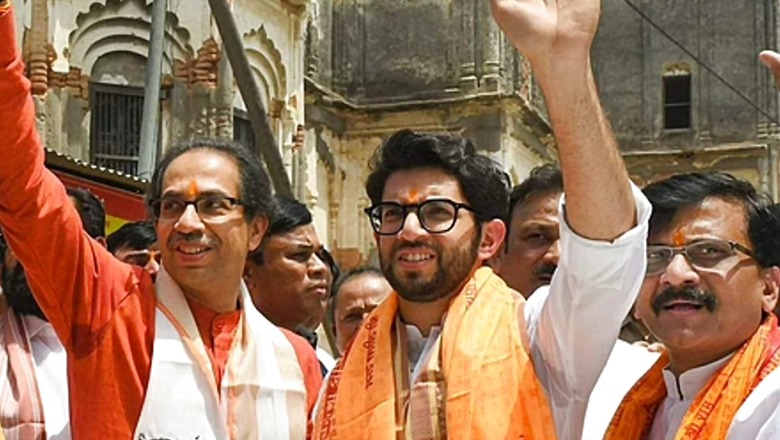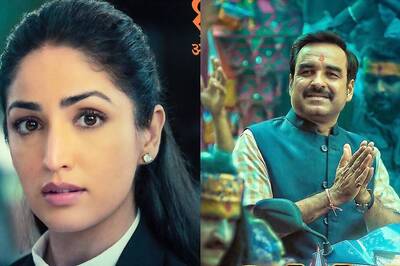
views
Maharashtra is currently the theatre where the dangers of dynastic politics are on full display. Amid the ongoing political turmoil in the state, it has become amply clear that political dynasties are the biggest threat to democracy. The fortunes of those who are in politics only on the basis of their surnames are dwindling in the state.
When Shiv Sena leader Sanjay Raut arrogantly asked members of his party who have chosen to part ways to “seek votes in the name of ‘apne baap’ (your father) and not Balasaheb Thackeray,” he showed that dynastic politics is the evil that breeds contempt and disregard for people who too have contributed to the party through their sweat and blood.
Turning political parties into family-run enterprises is an old scourge of India politics. A challenge which began to take roots right after Independence. It was in the 1950s that the Congress sowed the seeds of dynasty in the party system and since then the undemocratic practice has only spread. It has more or less become a part of the conduct of Indian politics.
The problem has been so deeply ingrained that today, with the exception of a few parties like Bharatiya Janata Party, Communist Party and Janata Dal (United), the basis of the formation and operation of all other parties is dynastic in nature.
All such political parties try to take cover by pointing at the fact that even the BJP has leaders whose sons and daughters become leaders. It is thus pertinent to clear the air. A leader’s son becoming a leader is not dynasty. The complete takeover of a party by one special family is dynastic politics. It is system where members of that family treat the reins of party as an object of inheritance.
It is the system under which for decades, the command of the Congress has been in the hands of the heirs of Pandit Jawaharlal Nehru, the command of the Samajwadi Party in Uttar Pradesh has been in hands of the family of Mulayam Singh Yadav, the command of the Rashtriya Janata Dal in Bihar has been in the hands of the sons of Lalu Prasad Yadav.
The nature of Indian democracy has been such that dynastic politics can always come under sharp criticism. During the period of Nehru, Dr Ram Manohar Lohia criticised it harshly. Lohia went to the extent of equating dynasty with monarchy. Many leaders and thinkers of the socialist faction, including George Fernandes, have considered dynasty to be fatal for democracy.
In the course of time, the evil of dynasty has become so ingrained in the politics of India that even the parties that were not formed on the basis of ‘vansh’ or ‘family’ have fallen prey to the evil. This has completely wiped out inner party democracy in such outfits.
Recently, Prime Minister Modi himself expressed concern over this evil and saying, “If not giving a ticket to the kin of a MP is a sin, then in BJP, I am responsible for committing this sin. I decided that tickets would not be given to such people. I am against dynasty politics.”
Coming straight from the Prime Minister, the message assumes wider significance. It reflects an honest effort to ensure that dynastic politics never finds a place in the BJP.
Yes, it is true that sons and daughters of senior BJP leaders can become leaders but their entry and growth depends on merit and at no point can they claim a party position or ticket on the basis of what their parents have done for the party. Their entry and growth depends on their winnability and organisational skills.
The silver lining for the current political dynastic mess in India is that despite its deep roots, it is being challenged and in many cases being thrown out and rejected by the electorate.
The claims being laid by political scions on their parties are being challenged from within the party. The best example of this is the Congress, where the culture of dynastic politics has become so entrenched, it defines the party as the Nehru-Gandhi fiefdom. But even in the Congress, now questions are being raised on whether the party should be freed from the ‘Gandhi’ family hold and move towards a new alternative. There is internal division in the Congress on this question signalling that the days of the unquestioned hold of the ‘Gandhi Parivar’ could well be over.
The same trend is visible in regional parties too where the second generation of ‘special families’ is facing dissent, opposition and confrontation from within the ranks of the party. The internecine struggle of the RJD in Bihar is an example. The same was seen in the Samajwadi Party in the run-up to the 2017 assembly elections.
The latest example of the perils of running a ‘dynastic’ party for the second generation is the internal turmoil of the Shiv Sena. At the heart of this whole tussle is the battle of ‘Balasaheb ki Shiv Sena’ i.e. the ‘real Shiv Sena’ versus others. Whatever the reason for the tussle between Eknath Shinde and Uddhav Thackeray, the deepest implication of this conflict should be seen as a challenge to the dynastic occupation of the ‘inherited party’.
This is a good indicator for the future of democracy in India. The development will discourage dynastic thinking. Dynasts will think twice before staking claim to the party as a family-run enterprise. The claims of inheritance will be weakened in the times to come.
Apart from the party rank and file, dynasty is being rejected by the voters too. Rahul Gandhi political drubbing in Amethi at the hands of Smriti Irani was a rejection of dynastic politics and thumbs up to a hardworking politician with no family history in the field of politics.
It needs to be understood that the more the vine of dynasty shrinks, the stronger democracy grows. Dynastic inheritance of parties compromises on merit and distances people from their leaders. It is thus important for each and every individual and every party to think over this.
The author is associated with BJP think-tank SPMRF. The views expressed in this article are those of the author and do not represent the stand of this publication.
Read all the Latest News , Breaking News , watch Top Videos and Live TV here.




















Comments
0 comment